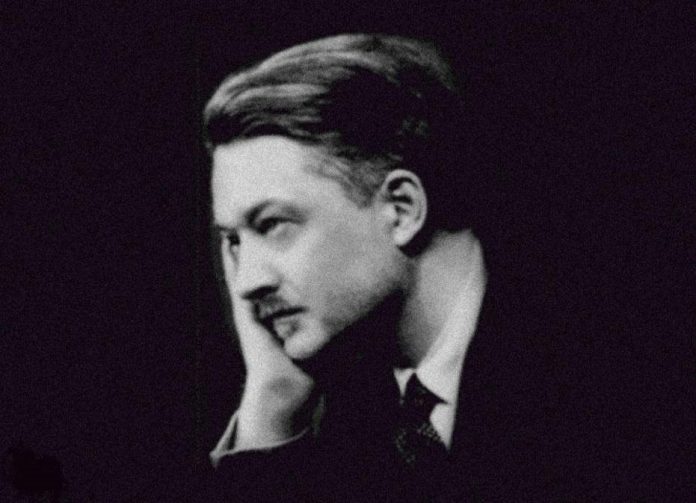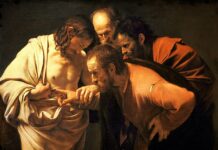Born and raised in the age of the horse and buggy, the Frenchman Jacques Maritain (1882-1973) is widely regarded as the 20th Century’s most eminent Catholic philosopher. In youth he was a self-admitted candidate for suicide before he abandoned atheism. Early on, at the suggestion of his wife Raissa, he steeped himself in the works of St. Thomas Aquinas and by old age had written sixty books of philosophy and theology. At the end of World War II his fame as a thinker earned him appointment to the team that crafted the Universal Declaration of Human Rights commissioned by the newly created United Nations. Soon after, he wrote The Person and the Common Good (1947), a book that has suffered unfortunate neglect over the last 70 years, and is now more than ever a necessary guide to overcome the resurgent waves of socialist insanity threatening yet again the collapse of Western Civilization.
Enter Thomas Aquinas
Maritain begins his book by asking, “Does society exist for each one of us, or does each one of us exist for society.” But Maritain regards this traditional way of asking the question as fraught with difficulties. Reaching back into the teachings of Aquinas, he formulates the question differently. The rights of the individual and the rights of society cannot be truly examined unless we stop seeing only the rights of the one against the rights of the many. This is a purely numerical equation that leads to disastrous results. The individual is more than a unit of one. Society is more than a unit of many. Working from St. Thomas, Maritain reminds us that there can be no peace between individualism and collectivism unless first it is recognized that a certain metaphysical proposition is missing from consideration.
What is that proposition? Well, most sociologists do not recognize metaphysics as relevant to anything; they run from metaphysics as if from the plague. But for St. Thomas, the metaphysical proposition that must be relevant is this: God has made us more than individuals. He made us persons, His children whom He loves more than the universe itself. The attribute of a person is that he or she is made in the “image and likeness” of God; made moreover to know and love God and be united with God for all eternity. This metaphysical proposition is denied by those who see individuals as those who can be defined only by the way they wish to be defined.
Because each person is precious to God, the dignity of the person cannot be violated without offending the Person who endowed everyone with that dignity. To speak of a person as an individual is to reduce his dignity to a number. But when each person is allowed the status of child of God, a person, it is impossible to treat him as anything less. Think of the tens of millions Hitler and Stalin and Mao sent to be slaughtered as “deplorables,” certainly not as children of God. And so, Maritain says with Aquinas, this is what those who are without God and a metaphysical approach to reality cannot, or refuse, to understand: “Together, God and the soul, are two in one; two natures in a single vision and a single love. The soul is filled with God. It is in society with God. With Him it possesses a common good, the divine Good itself.”
Each person is not alone in this association with the divine Good. All persons are drawn together toward participating in the society of God’s friendship. Those who accept God’s friendship know it full well by the experience of grace showered upon their lives: the grace of love; the grace of peace; the grace of friendship with God and fellow creatures. All of this is prelude to the consummate experience of grace in the Beatific Vision prepared for us in what St. Augustine called the City of God. It is in what St. Thomas calls the “speculative” (divine) rather than the “practical” (worldly) intellect that metaphysics finds its home, that is, in the life of contemplating God and all affairs of the spirit, such as virtue, peace of soul, and beatitude. Without giving the self to this contemplative life, the soul flounders upon itself and falls back into and is submerged in the purely human life that is solitary and defenseless in coping with a downward spiral of the spirit into our lower animal self.
Individuality and Personality
The distinction between the individual and the person is of paramount importance. Maritain cites St. Thomas: “The person [as image and likeness of God] is that which is most noble and most perfect in all of nature.” Then Maritain goes on to cite Pascal’s view that “the self is detestable.” But the self is not the person; the self is selfish. The self is the individual stripped of the person. That is, the self is the material part of man that, when left to itself (and bereft of all metaphysical sense of God, the soul, and immortal destiny) is free to descend even lower than the ape. The soul is not the body.
Spirit is personal and everlasting, while the body is individual and corruptible. For this reason, whatever happens to the body in the course of its life is not the same as what happens in the soul. The body will perish in time. The soul will not. The soul can abandon its destiny to be with God, but it can also undo its sinfulness and reform itself by the grace of God. The body can make no ultimate decisions, but the soul, by virtue of free will, can and does. The body cannot kill the soul, but the soul, by virtue of its power to make fatal decisions, can kill the body.
Bound up in the reality of the person is the power of love. St. John said God is love (1 John 4:8). This is consistent with the fact that we view our God as a personal God, rather than the god of Aristotle, the Unmoved Mover, or pure Intellect. Since God is love, the persons God made in his image and likeness are also the objects of his love, and they in turn are drawn toward God (even when they deny it) as the moth is drawn toward light. At the very heart of every person’s being, then, is love of God (realized or not), which extends naturally to all other persons; that love visibly or invisibly pervades the whole of creation. This is why the command to love one another is at the heart of all God’s commands, and why human friendship is not merely an individual attraction (spiritual and/or carnal) between two individuals, but a love good for every person and for the common good.
It is certainly true to say that we are all both individuals and persons. The distinction having been made, Maritain goes on: “Of course, material individuality is not something evil in itself. Obviously, as the very condition of our existence, being an individual is something good. But it is precisely as related to personality that individuality is good. Evil arises when, in our actions, we give preponderance to the individual (selfish) aspect of our being…. Thus, man will be truly a person only in so far as the life of the spirit and of liberty reigns over that of the sense and the passions.” At the heart of this question is the fact that we all have a moral choice to make, and we cannot avoid the obligation to choose.
But, lurking in the background, are those who would blur the distinction between person and individual. There are those who would affirm the individual over the person, the usual consequence of which is mindless and hateful anarchy. But also there are those who would affirm an imaginary “race of angels” (the fantasy of socialist dreamers – such as imagining a Nazi race of Supermen) who would transcend and overcome personhood everywhere. Whether individualism or angelism or personalism triumphs will depend upon who controls the levers of education for the next generation. Hitler’s Youth exemplified that socialist dream of carrying on his insanity for a thousand years.
The Person and Society
The “person” then is a great deal more than a mere “individual.” Indeed, if love itself is at the heart of all personhood, this means that understanding the proper relations between the person and society is of paramount importance. While a solitary life may suffice for some, most people require social interactions that supply their needs for the necessities of life, for common worship and character training, for courting and starting a family, for getting knowledge and educating the young, for medical needs, and of course for all those friendships and alliances without which life might seem empty and lonely, and futile. Or as the poet John Donne put it, “No man is an island entire of itself; every man is a piece of the continent.”
The good of the person, which every person seeks one way or another (even when the method of seeking is delusional) will be accompanied by the common good of society as the end toward which the personal good is directed. When the good of each person is achieved by right and lawful choices, the common good of society will be enhanced, and that common good in turn will flow back into the good of each person. This is the foundation of the social contract between persons and societies, that they benefit each other and do so consistently with the aim of justice for all. As Maritain puts it:
Thus, that which constitutes the common good of political society is not only: the collection of public commodities and services – the roads, ports, schools, etc. which the organization of common life presupposes; a sound fiscal condition of the state and its military power; the body of just laws, good customs and wise institutions, which provide the nation with its structure; the heritage of its great historical remembrances, its symbols and its glories, its living traditions and its cultural treasures. The common good includes all of these and something much more besides – something more profound, more concrete and more human…. For these things all are, in a certain measure, communicable and so revert to each member, helping him to perfect his life and liberty of person. They all constitute the good human life of the multitude…. Only on condition that it is according to justice and moral goodness is the common good what it is, namely the good of a people and a city, rather than of a mob of gangsters and murderers.
There is among humans a tension between two types: those committed to affirming the communicable and metaphysical values of personhood on the one hand, and those resisting such values and retreating into their private individuality on the other. If I read Maritain rightly, it is perhaps permissible to make an analogy here between the altruist (whose center of being is love of self and others) and the egoist (whose center of being is love of self). The personalist is open to the interest of others, even to the point of sacrificing self interest; the individualist is preoccupied with his own interests, but less sacrificing to the interest of others unless their interests coincide with his own.
Here Maritain offers what is for many a startling insight: the good of society is superior to the good of the person, but the good of society must conform to the good impulses of persons (as opposed to the less good and sometimes evil impulses of individuals) for that superiority to be valid. The good society must be good because its persons are good. Individuals who hate God or are indifferent to God can hardly be said to be adequate vehicles for achieving the common good (though they might ally themselves with a cause for the common good if they see some benefit for themselves in doing so). Parenthetically it may be said here that a bold atheism or an indifference to God gains ground among the masses, individualism will gain ground with it and personalism will retreat, resulting in the decline of the common good.
Individualism is the trait of those animated by self interest who lack real personhood (again, a metaphysical view of life with love at its center). Such individuals work their way up to the levers of economic, religious, and political power, and mischief follows, more often than not catastrophic for the common good. For example, the cult worship of individualism inspired by Rousseau, which gave rise to the spread of 19th Century individualism and the worst kinds of human exploitation (for examples, slave wages and child labor exploitation) resulted in the 20th Century backlash of tyrannical and atheistic socialist governments that resulted in horrible genocides and two World Wars.
It is a fact in Europe, Russia, China, North Korea and elsewhere that socialism’s most notorious champions tended to be homicidal, and only preached a false benevolence to justify their true objective – seizing the reigns of Power – regardless of the human carnage that followed. Following Aquinas, Maritain insists that the command to work for the “common good” demanded of citizens in totalitarian states is not necessarily legitimate, and no rational claim can be made by tyrants for the citizens’ loyalty to, or the defense of, such states. Every godly person’s first duty is not to the state, but to God. The German judges who collaborated with Hitler in the persecution of Jews and Christians had to know they had adopted for themselves the same homicidal policies we find in those who justified the persecution the early Christians at the behest of Caesar.
The common good of all is relative to the good of each person. Both the common good and the personal good are directed to a supernatural good, and finding this Transcendent good is the business of the Church of Christ, alone the vehicle by which (personally and collectively) we speed to our eternal destiny beyond this world. Thus we may say, in our post-Christian world, that what Maritain said in 1947 must be as true today as it was then. But if we look at the course of history since that time, we see a great discrepancy in how people now think along metaphysical lines with how they thought then. Rank individualism has triumphed over the good of persons and the common good. This individualism (which got a huge boost from the writings of the libertarian Ayn Rand) is promoted by the notion that individuals and societies ought to be free to behave in whatever manner they like, because liberty alone is the supreme value that bows to no other.
Libertarianism for this reason disconnects us from whatever obligations we have to behave in such a way as to earn our eternal reward. “Do unto others as you would have them do unto you” is certainly not at the top of the libertarian’s ladder of values. Certain basic laws may still prevail with libertarians, such as those prohibiting murder and tax evasion, but the number of traditional laws dwindles as an increasing number of individuals clamour for the legalization of actions once considered bizarre, unnatural, and intolerable by those who have always believed that the common good is only possible if the good of persons prevails. We all know the most notorious case is that of a libertarian state advancing the right to kill unborn children, justified by the absurd logic that an unborn child is not a person with his or her own personal destiny to fulfill. The slaughter of the unborn cannot contribute to the common good.
Contemporary Problems
As already pointed out, Maritain sees the principal culprit in individualistic materialism, the crass and soulless repudiation of a transcendent God who governs humans and calls them forth to their eternal destiny. There is no other path for the Left but aggressive atheism at worst, spiritual indifference at best. Maritain does not put it exactly in these terms, largely because, writing in 1947, a militant and universal atheism had not yet boldly raised its flag so high as it would do over the next seven decades. But international Communism had already led the way by subordinating the good of the self to the good of the state, which is far from the common good, since under Communism only the Dictator gets to decide the common good. The person as a repository of metaphysical values, the materialists say, is no longer useful to establish the common good. The person now has become an individual, a cog in the machinery of the state, who can be useful if he cooperates, or liquidated if he does not. Under an atheist regime, there exists no ultimate brake (fear of God, for example) to slow down and halt the ruthless grinding up of persons. As Maritain puts it:
Social life is destroyed by the individual whose selfishness looks to the state machinery for everything; now it swallows up the individual’s hopes; now it annihilates his liberty and dignity by crushing him. Thus in different ways, all that is proper to the human person as person and to society as the city of persons is eliminated.
Surveying the various types of individualism, Maritain saw that one of the most irreligious of them was bourgeois materialistic liberalism, which is atheistic in fact even when it seeks, for convenience sake, to disguise itself with a barely visible tolerance of religion. Socialism goes farther than materialistic liberalism by not concealing its enmity with the Church, and ironically by representing itself as more Christian than Christianity; for it seeks (impossibly) to bring heaven down from the clouds and plant it on the earth. This is the greatest and most threatening of Christian heresies, for it denies Christ his sacrifice on the cross and demands instead the sacrifice all of humanity to the god Moloch. There is no other recourse: either we live for Christ the King, or false prophets lead us irresistibly into the jaws of despair and death.
Conclusion
Today in the Americas and great swaths of Europe we can see that Maritain gave us a blueprint of what to expect as the great heresy of liberal materialism refuses to go away, or we refuse to forcefully confront and overcome it. Most notable of all is the advance of the highly organized liberal militias against the Catholic Church, more obvious now than ever, as all Christian Churches, not just the Catholic, are invaded by Trojan horses of the Left. Then we see an international army of Marxists openly seeking the takeover of national governments as they enter into and occupy with strident steps the halls of national governments. They are pleased to call themselves democratic socialists, rather than Communists; as if by revising the teaching of history in the classrooms they can obscure the fact that Hitler’s party called itself the National Socialist German Workers’ Party, and Stalin labeled his empire the Union of Soviet Socialist Republics (before the empire failed and was reduced to Russia’s present shadow of its former self).
Perhaps, in the aftermath of victory over Nazi socialism in World War II, Maritain could afford to be more hopeful in 1947 than many are today. Yet hope, that most popular and persistent of virtues, never goes away. Maritain closes his book by offering us a clue to the future as the storm clouds of socialism pass over us. He notes that the repudiation of godly and metaphysical personalism in favor of atheistic and materialistic individualism is one of those absurdities which is self defeating; because the political order given birth by this movement is fatally drawn toward dictatorship … an ultimately self-devouring monster which indiscriminately consumes all in its path, until it has no one left to consume but itself.












